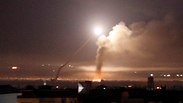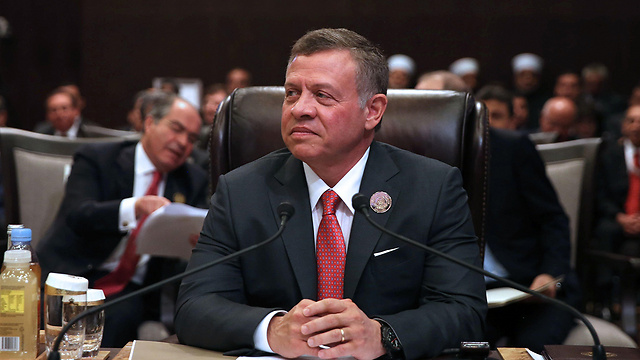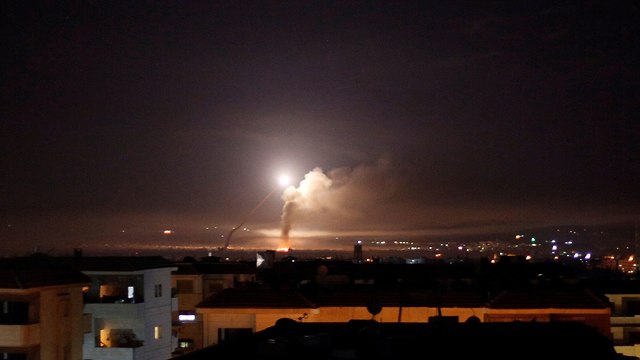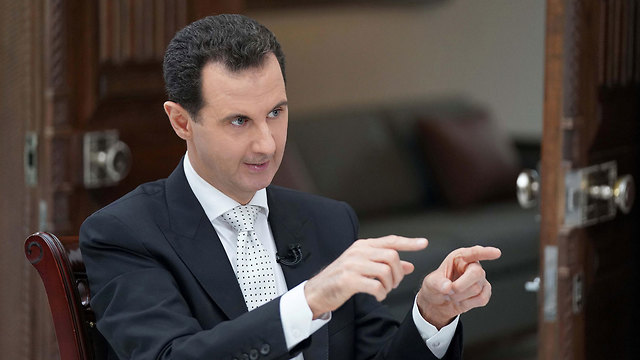
File photo
צילום: רויטרס
Russia reportedly gives Israel conditional 'green light' on Syria strikes
Following Defense Minister Lieberman's meeting with his Russian counterpart, Russia purportedly consented to allowing Israel to operate in Syria, so long as it did not target regime assets; understandings were also said to have been reached regarding removing Iranian forces from country's southern border.
Russia gave Israel the "green light" to operate in Syria's territory, so long as assets belonging to the Syrian regime remain unscathed, a Russian source told the London-based Asharq Al-Awsat newspaper Friday.


According to the same Russian official, who spoke on the heels of a meeting between Defense Minister Avigdor Lieberman and his Russian counterpart Sergey Shoygu the previous day, Russia and Israel also reached an understanding regarding removing Iranian forces from Syria's southern frontier.
According to the understandings, Iran will initially pull back its forces to within 20 kilometers of the border, and later to a range of 60 to 70 kilometers, with Russia underlining the fact that this was a gradual process.
The aforementioned meeting between Lieberman and Shoygu took place in Moscow Thursday, with the two ministers discussing the situation in Syria and the Islamic republic's presence there.
"The State of Israel appreciates Russia's understanding of our security needs," Lieberman told his counterpart.
The meeting dealt with security issues concerning the two countries and security coordination between them, the situation in Syria, and Israel's efforts to prevent Iran from establishing itself in Syria.

Defense Minister Lieberman (L) and his Russian counterpart Shoygu (צילום: אריאל חרמוני, משרד הביטחון)
"It is important to continue our dialogue and keep the open line between the IDF and the Russian army on all the issues on the agenda," Lieberman said.
Ynet's military correspondent and commentator Ron Ben-Yishai reported Thursday Russian President Vladimir Putin wanted Israel to allow Syrian President Bashar Assad's army to move southwards to the Jordanian border and secure all of the Syrian Golan Heights.
In return, the Russian president is willing to promise Israel that Iran's Revolutionary Guards Corps and Iran-affiliated militias will not be present in the territories Assad's army takes.
What the Russians are suggesting is to pull back forces loyal to Iran—including Hezbollah—to a distance of 60-70 kilometers east of the ceasefire line in the Israeli Golan. In any event, they will certainly not be present beyond the road connecting Damascus and as-Suwayda, the capital of the Druze governorate of Syria, and the Jordanian border.
The Syrian army's purpose in so doing, as per Russian sources, is to overtake three areas. The first is the Jordanian-Syrian Nasib border crossing southeast of Daraa and the second is Tel al-Harra, which overlooks the Israeli Golan and the armistice line—merely 12 kilometers east of the Israeli border.
Until the latter location was taken two years ago by rebels, it housed an Iranian intelligence outpost that collected signal intelligence from both observations and wiretaps, not just from Syrian rebels but also—and mostly—from Israel.
The third point is the town of Busra al-Harir, 30 kilometers northeast of Daraa.
These three strategic points will effectively allow the Syrian army to control the entire region, over which it currently only has partial control. Rebels number some 35,000 strong in the area, include Islamic State combatants present in the tri-border area of Syria, Israel and Jordan.

Jordan's King Abdullah seeks to prevent another wave of Syrian refugees from drowning his country (צילום: AFP)
The Syrian regime, with Russian support, is therefore attempting to isolate the Syrian rebels encamped in the Lajat region, with as-Suwayda in its center, and put some daylight between them and the Jordanian border, through which they receive US aid.
Russia plans to introduce Russian military policemen to the region once it's taken by the Syrian army, who will then disarm the rebels of their heavy weapons. This ambitious Russian scheme has met with resistance from both Israel and Jordan.
The Russians have asked Israel to not prevent the Syrian army from going down into the region, and to refrain from retaliating if errant regime fire trickles from Syria so as not to sabotage its war effort. Israel was also asked to not target Russian advisers embedded with the Syrian forces.












